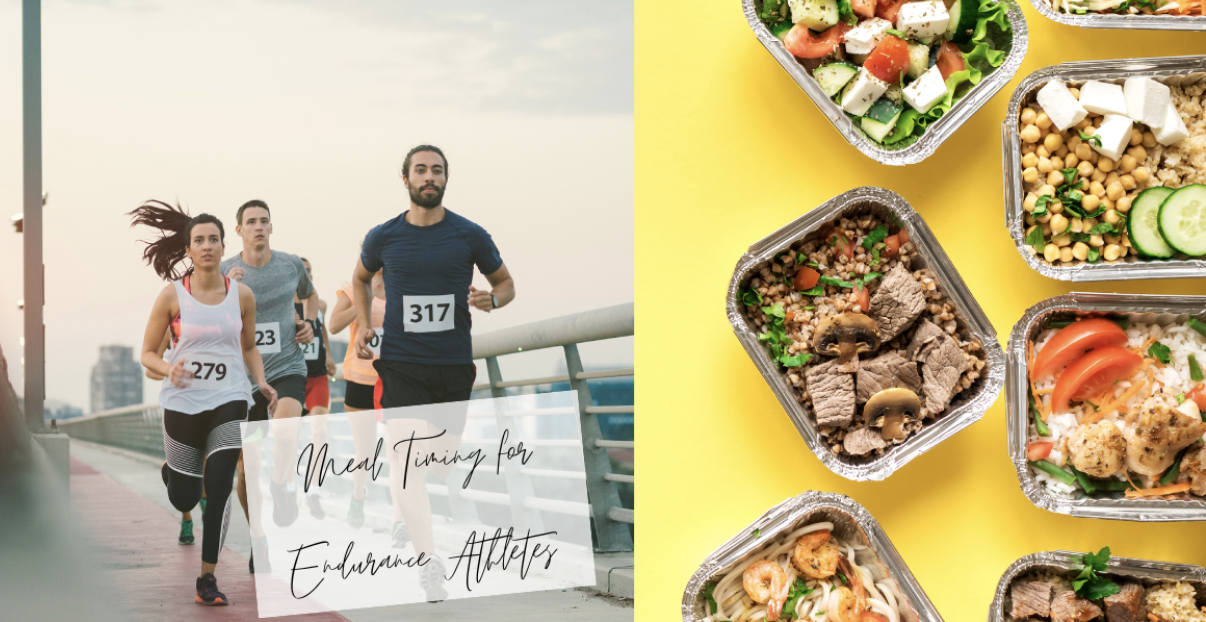Meal Timing For Endurance Athletes:
Pre/Post Workout Nutrition
As an endurance athlete, your meal timing and nutrition are essential parts of enhancing your performance. Sports dietitians work hard with athletes by optimizing their meal timing through trial and error of what and when to eat around training. Through meal timing and performance nutrition, you can improve stamina, decrease recovery time, and increase focus and motor control.
You may now be wondering…
What is the best meal timing for endurance athletes? What is going to take you to the next level on race day?
Keep reading to find out when and what to eat pre and post-workout, how to hydrate with electrolytes, and why meal timing matters! From your favorite sports dietitian nutritionist.
Importance of Meal Timing for Endurance Athletes
Athletes are normally constantly on the go, between training sessions, races, travel, and being normal people. All at the same time!With this busy lifestyle comes a need for having a nutrition plan that accommodates your schedule, while still giving you the fuel that you need. No more skipping meals, inconsistently snacking, or forgetting to get your carbs in. All of which can lead to hitting the wall due to a lack of fueling prior to exercise.
A few benefits of proper meal timing for endurance athletes are:
Decrease in risk of injury including cramps and muscle strains
Increase in energy and stamina
Set the tone for your event on race day
Decrease GI distress and related symptoms
Replenish glycogen stores in your muscles
Now let’s get into when and what you should eat pre and post-workout!
WHAT to Eat Pre-Workout
Especially as an endurance athlete, it is beneficial to eat before your workout instead of working out fasted. This will ensure that your short-term glycogen stores are replenished. The most important macronutrient for pre workout is carbohydrates. You will want your meal or snack to be high in easy to digest carbs, moderate in protein, and low in fat/fiber. Whole foods are the preferred source of fuel, but sports products and convenience foods can also be used when necessary. What works best for one athlete pre-workout, may not work best for the next. It is important to trial and error different meals and snacks to see what works best for you!
Bonus tip:
It is better to trial meals during practice or training rather than on a race day. You want to stick to what you and your body know during your big events!
WHEN to Eat Pre-Workout
When it comes to how far ahead to eat your meal, this can depend on many factors. It is usually recommended to eat a minimum of 1 hr before and a max of 4 hours before.
If you are eating 1 hr before, it is recommended to eat 1 gram of carbs per kilogram of your body weight.
If you are eating 2 hrs before, shoot for 2 grams of carbs per kilogram of body weight.
Calculation tip: to get from pounds to kilograms, simply divide by your weight in pounds by 2.2.
WHEN and WHAT to Eat Post-Workout
After your training session, it is important to provide your body with the right calories and nutrients to recover properly.
It is recommended to eat carb and protein-rich foods post-workout.
The National Academy of Sports Medicine (NASM) encourages athletes to consume a carb-rich snack within 30 minutes of exercise completion. This should consist of around 1.0-1.5 grams of carbs per kilogram of body weight.
For protein, aim for 15-25 grams within one hour of your workout to maximize muscle and tissue repair.
You will want to trial and error your post-workout meals just the same way you did for your pre-workout meals. Figure out what works best for you as an athlete!
Hydrating with Electrolytes
Endurance athletes can easily become dehydrated if water and electrolytes are not replenished properly during and after a training session. If you are exercising for less than an hour, you should be able to get away with just drinking plain water. However, if you are training for >1 hour, you will want to add electrolytes of some kind to your water. This can be as simple as adding salt or salt sticks, or you can look into electrolyte powder mixes that can be added to your water.
You can figure out your fluid loss by calculating your sweat rate, which will help give you an idea of how much to rehydrate.
A few of my favorite electrolyte mixes for endurance athletes are Skratch Labs and Liquid IV.
The Takeaway
As you can see, there are plenty of ways you can use meal timing for endurance athletes to optimize your performance nutrition. The order, timing, and composition of your meals can be the difference between first or second place at your next big event! If you are looking for additional ways to support your health as an athlete, reach out to me through my services page. I have a few spots open in my one-on-one coaching program for athletes!
